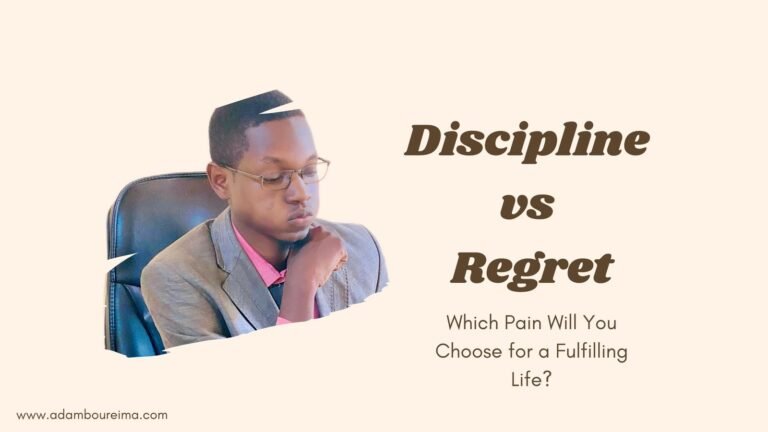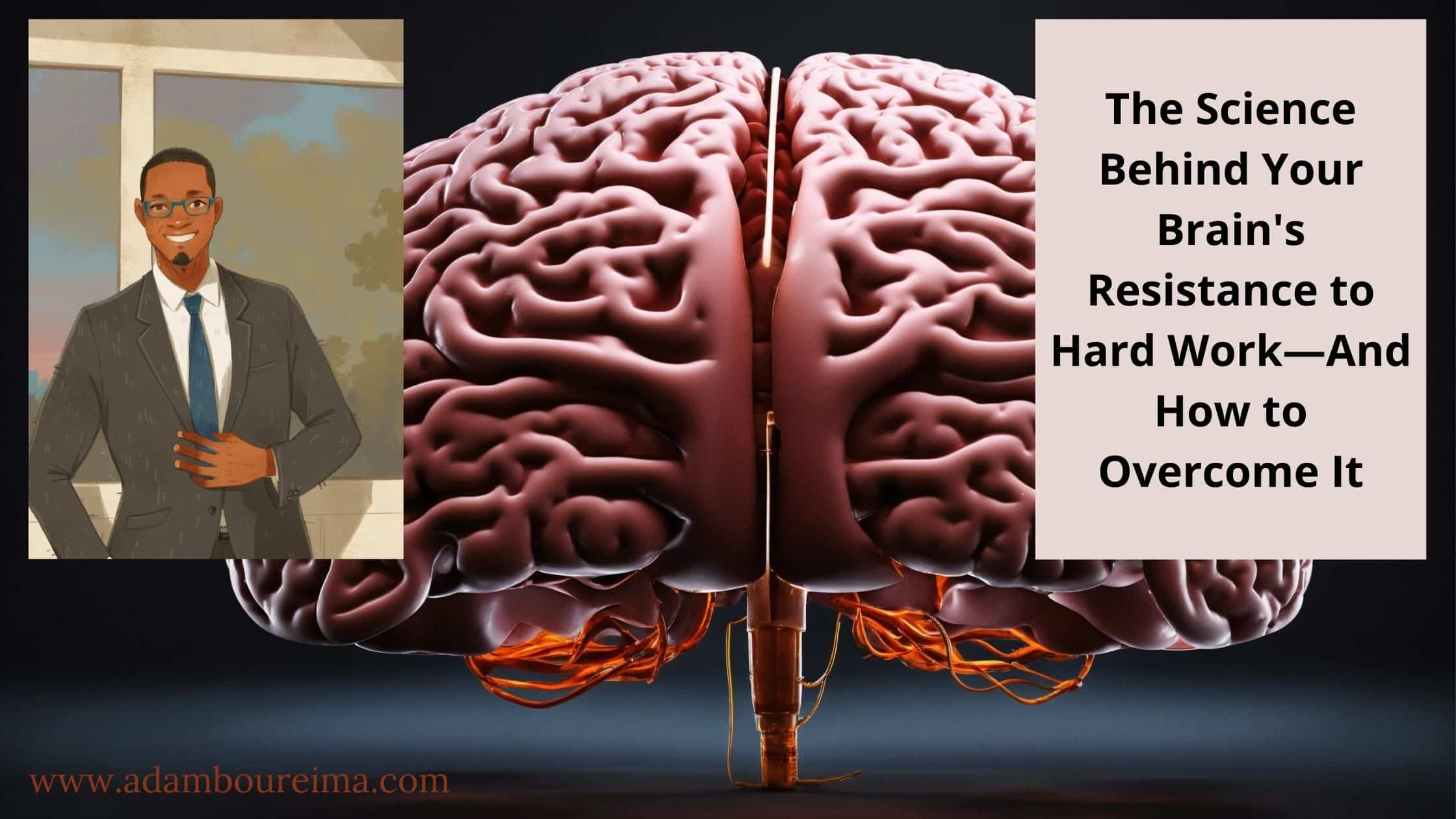Introduction: The Two Pains of Life
Life presents each of us with challenges, obstacles, and difficult choices. While we may not have control over all circumstances, one crucial aspect remains within our power—the type of struggle we choose to face. In every situation, we are confronted with two primary forms of pain: the pain of discipline and the pain of regret. Both are inevitable, but the impact they have on our lives and our futures differs dramatically.
The pain of discipline is the discomfort that comes with pushing ourselves beyond our limits, maintaining focus, and consistently taking action toward our goals. It requires effort, persistence, and sacrifice in the short term, but ultimately leads to growth, achievement, and personal fulfillment.
On the other hand, the pain of regret comes from inaction, avoidance, and missed opportunities. It is the bitter realization that you could have done more, tried harder, or made different choices. Unlike the pain of discipline, regret lingers long after the moment has passed, leaving you with a sense of loss and disappointment.
The choice between discipline and regret shapes not only your current reality but also the trajectory of your entire life. The key to success and fulfillment lies in understanding the distinction between these two pains and consciously choosing the one that leads to lasting rewards. While the pain of discipline may seem difficult in the moment, it is far more bearable than the enduring burden of regret.
Understanding the Pain of Discipline
The pain of discipline is the discomfort that comes with committing to consistent effort, sacrifice, and delayed gratification. It’s the choice to push beyond immediate desires or distractions in favor of long-term rewards. Discipline often feels like an uphill battle because it requires you to do what is necessary, not what is easy or pleasurable in the moment.
The Short-Term Discomfort of Discipline
When you choose discipline, you embrace a certain level of discomfort. Whether it’s waking up early, resisting temptations, or sticking to a rigorous routine, discipline demands that you set aside short-term pleasure for long-term gain. It requires you to focus on the bigger picture, accepting that the discomfort you face today will pave the way for future success and fulfillment.
Unlike fleeting indulgences, which provide instant gratification but fade quickly, discipline builds lasting habits and creates a solid foundation for sustained achievement. The sacrifices you make—time, energy, or convenience—are not losses but investments in your future.
The Long-Term Benefits of Discipline
While the immediate effects of discipline might seem tough, the long-term benefits far outweigh the temporary discomfort. Discipline leads to steady progress, mastery, and the satisfaction of achieving meaningful goals. Whether it’s a healthier body, a thriving career, or a sense of personal growth, the rewards are lasting and profound.
Take working out regularly as an example. The discipline to hit the gym day after day might feel like a burden at first, but over time, you build strength, improve your health, and boost your confidence. The same goes for learning new skills—whether it’s mastering a musical instrument or coding—discipline ensures that you stay on course even when the process is slow or challenging. Over time, the compounded effect of your efforts leads to expertise and new opportunities.
Examples of Discipline:
- Working out regularly: The pain of dragging yourself to the gym on days when you’d rather stay in bed pays off in increased fitness, health, and confidence.
- Learning new skills: The frustration of learning a difficult subject or acquiring a new skill, such as coding, is rewarded with new capabilities and career advancements.
- Adhering to a routine: The discipline of following a strict schedule helps you stay productive, meet deadlines, and avoid the chaos of last-minute rushes.
By choosing discipline, you’re choosing to endure short-term discomfort in exchange for long-term success, growth, and fulfillment. Ultimately, the pain of discipline is far less than the weight of regret for the opportunities missed by avoiding it.
Understanding the Pain of Regret

The pain of regret is often more profound and lasting than the pain of discipline. While discipline involves short-term sacrifices that lead to long-term gains, regret is the emotional burden that comes from missed opportunities, poor decisions, or failing to take action when it mattered most. It is a lingering, often heavy feeling of “what could have been,” which can lead to feelings of guilt, disappointment, or even self-blame.
The Emotional Toll of Regret
Regret can weigh heavily on a person’s mind and heart. Unlike the pain of discipline, which fades as rewards accumulate, the pain of regret often intensifies over time. It stems from the realization that, with different choices or more effort, the outcome could have been better. This understanding leads to a sense of loss—not just of an opportunity but of time, potential, and growth. Regret reminds us of the roads not taken, the dreams left unfulfilled, and the moments wasted.
One of the most challenging aspects of regret is its permanence. While you can change your habits and decisions moving forward, you cannot go back and fix what has been missed. This makes the sting of regret much sharper than the temporary discomfort of discipline.
Regret vs. Discipline
Unlike the short-term sacrifices of discipline, regret comes from inaction or avoidance of effort. Where discipline asks for a little discomfort today in exchange for tomorrow’s rewards, regret is the price paid for avoiding that discomfort. People who avoid discipline often end up with regrets because they failed to make the most of their time and opportunities.
The pain of regret is not just an acknowledgment of a missed chance but also a realization of what that missed chance could have brought. It is more than just wishing things were different—it’s understanding that with a little more effort or courage, they could have been different.
Examples of Regret:
- Not pursuing dreams: One of the most common regrets is not following a passion or dream, whether it’s a career path, creative endeavor, or entrepreneurial venture. Looking back, the person may feel a deep sense of loss for the opportunities they let slip by and the potential they never explored.
- Neglecting health: Failing to take care of your physical or mental health, whether through poor diet, lack of exercise, or unmanaged stress, can lead to regret as the consequences manifest later in life. Health, once lost, is difficult to regain, and the regret of neglecting it can be overwhelming.
- Failing to invest in relationships: Neglecting personal relationships, whether with family, friends, or romantic partners, can lead to deep regret, especially when those relationships deteriorate or people drift apart. The realization that stronger bonds could have been forged through small, consistent efforts can lead to long-lasting disappointment.
The Lasting Impact of Regret
Regret can influence future actions, but unlike discipline, it carries the weight of missed opportunities. While some people use regret as a motivation to change and grow, for others, it becomes a source of stagnation and emotional distress. The longer one avoids addressing the root causes of regret, the more it compounds, making it harder to move forward without the baggage of past mistakes.
The key difference between the pain of discipline and the pain of regret lies in their timing and longevity. Discipline is painful now, but it leads to growth and fulfillment later. Regret, however, is painless in the moment but comes with a much heavier and long-lasting burden when it’s too late to change the outcome.
In the end, the pain of regret can be avoided by embracing the short-term discomfort of discipline. The choice is yours: endure the discomfort now to achieve your goals or face the lingering pain of what might have been.
The Consequences of Avoiding Discipline

Avoiding discipline may offer immediate comfort, but it comes with long-term consequences that can shape the course of a person’s life. In the moment, it’s easier to choose relaxation over hard work, instant gratification over delayed rewards, or avoidance over effort. However, the true cost of avoiding discipline is not always apparent until much later, when it manifests as unfulfilled potential, missed opportunities, and a growing list of regrets.
The Illusion of Comfort
In the short term, skipping the effort needed to maintain discipline might feel like a relief. Whether it’s procrastinating on important tasks, abandoning personal goals, or ignoring responsibilities, these actions provide temporary comfort and a sense of freedom from stress. However, this “comfort” is an illusion. Each time you avoid discipline, you’re trading short-term ease for long-term challenges that eventually catch up with you.
Over time, avoiding discipline becomes a habit. Small, seemingly insignificant choices to delay or ignore action accumulate, leading to bigger and more impactful consequences down the line.
Missed Opportunities and Unfulfilled Potential
The most significant consequence of avoiding discipline is the long-term effect on personal growth and achievement. Every time you sidestep effort or persistence, you forfeit an opportunity for improvement. Success, whether in career, health, or personal development, doesn’t come from luck—it stems from consistent, disciplined actions over time. Without discipline, dreams and goals remain unfulfilled, and potential is left unrealized.
For instance, avoiding the discipline of studying leads to missed educational achievements, which can limit career prospects. Neglecting the discipline of financial planning can result in long-term financial instability. Failing to discipline oneself in personal relationships can lead to strained or broken connections. In all aspects of life, the absence of discipline diminishes progress and limits the possibilities for a fulfilling future.
The Weight of Accumulated Regret
While avoiding discipline offers a temporary escape from effort, it leads to a much heavier emotional burden: regret. As life progresses, the consequences of inaction and laziness become more apparent. The realization that you could have done more, achieved more, or become more weighs heavily on the mind and heart. Regret is often described as one of the most painful emotions because it represents lost time and opportunities that cannot be reclaimed.
The pain of regret is more enduring than the temporary discomfort of discipline. Where discipline requires short-term sacrifice, regret comes from a lifetime of missed chances, and its sting can persist for years. Inaction often leads to questions like “What if I had tried harder?” or “Where would I be now if I had followed through?” These lingering thoughts are much harder to shake off than the temporary effort required to stay disciplined.
The Ripple Effect on Other Areas of Life
Avoiding discipline doesn’t just affect one area of life; it has a ripple effect that impacts everything. For example, failing to maintain discipline in your career can also affect your financial stability, self-esteem, and relationships. Neglecting personal health and fitness can lead to chronic health issues, which in turn diminish your quality of life and your ability to pursue other goals. The consequences of avoiding discipline spread far beyond the immediate comfort they offer, often creating new problems in other areas of life.
Choosing the Path of Discipline
Ultimately, while avoiding discipline might seem easier, it creates far more difficulties in the long run. The discomfort of discipline is temporary and manageable, but the regret that comes from avoiding it is long-lasting and far more painful. The choice between discipline and regret is a fundamental one that shapes the course of your life. By choosing discipline, you open the door to growth, achievement, and fulfillment, while avoiding it locks you into a cycle of inaction and regret.
The Long-Term Benefits of Embracing Discipline
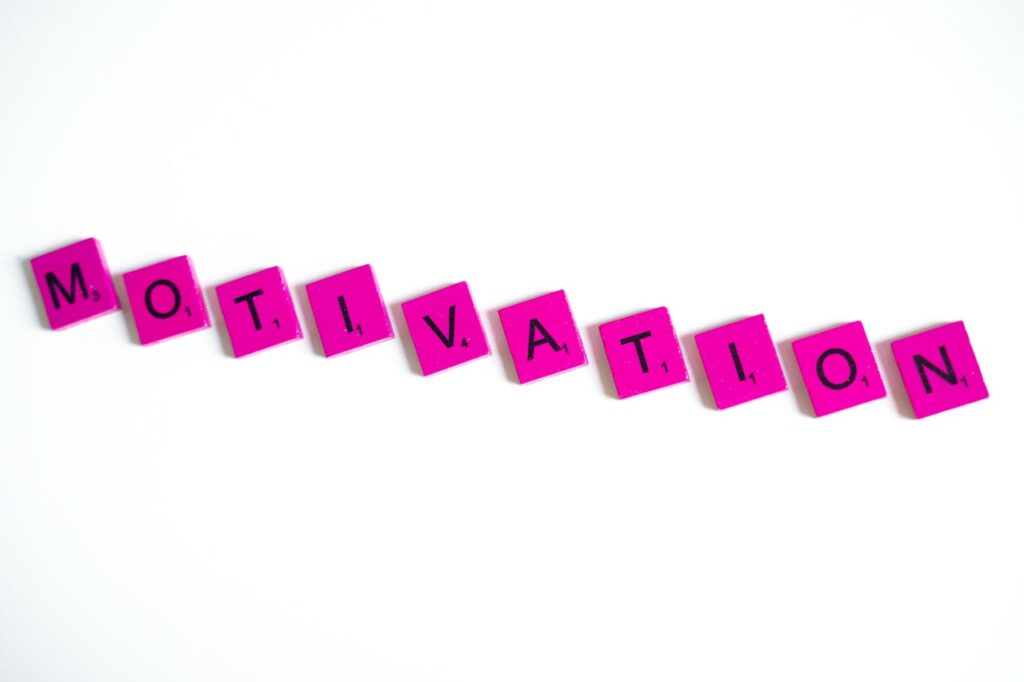
Embracing discipline doesn’t just protect you from the pain of regret—it leads to a series of long-term rewards that compound over time. While it can feel challenging to stay disciplined day after day, the cumulative effect of small, consistent efforts can transform your life in ways that avoidance never could.
Consistency Builds Momentum
One of the greatest benefits of discipline is that it creates momentum. At first, staying disciplined in any area—whether it’s fitness, work, or personal development—requires significant effort. But as you stick to your routines and habits, discipline begins to feel less like a burden and more like second nature. Over time, each small action builds upon the last, and what once felt like a struggle becomes a source of strength.
This momentum drives progress. For example, maintaining a disciplined study habit can lead to better grades, which then opens the door to more opportunities in education and career. In the realm of fitness, disciplined training leads to increased endurance and strength, which, over time, make new physical challenges more achievable. The beauty of discipline is that it grows easier the longer you practice it, and the rewards become greater the more you invest.
Discipline Leads to Mastery
One of the most powerful effects of discipline is mastery. Whether it’s in a career, hobby, or personal pursuit, mastery comes from the deliberate practice and consistent effort that discipline provides. When you focus on one skill, profession, or goal, discipline is what separates those who become experts from those who remain average.
Mastery is the result of disciplined actions repeated over time, even when they are difficult or uncomfortable. It’s the artist who perfects their craft through years of practice, the entrepreneur who builds a successful business through relentless effort, or the athlete who achieves greatness through daily training. Without discipline, mastery is impossible because it requires sustained dedication far beyond the point where most people give up.
Self-Discipline Fosters Confidence
Another key benefit of discipline is the confidence it brings. As you develop self-discipline and begin to see the fruits of your efforts, your confidence grows. You start to trust in your ability to face challenges, overcome obstacles, and follow through on your commitments. This self-assurance spills over into other areas of life, making it easier to take risks, set ambitious goals, and pursue your dreams.
With confidence comes a sense of control over your life. Instead of feeling like a victim of circumstance, you start to realize that you have the power to shape your future. The discipline you apply today equips you with the tools to navigate tomorrow’s challenges, reinforcing the belief that you are capable of achieving more than you once thought possible.
Achieving Long-Term Fulfillment
Ultimately, the greatest reward of discipline is long-term fulfillment. Discipline allows you to achieve meaningful goals that align with your values and purpose. While instant gratification may bring temporary pleasure, it rarely leads to lasting satisfaction. On the other hand, the rewards of discipline—whether it’s a successful career, strong relationships, or personal growth—bring a deeper sense of fulfillment that endures.
Fulfillment comes not only from achieving external success but also from knowing that you’ve given your best effort. There is a profound satisfaction in knowing that you stayed the course, overcame challenges, and pushed through discomfort to reach your goals. This sense of accomplishment far outweighs the temporary relief of avoiding effort, and it’s something that can never be taken away.
Discipline Enhances Relationships
Discipline doesn’t just benefit your personal goals; it also enhances your relationships. By applying discipline in areas like communication, empathy, and emotional regulation, you can build stronger, more meaningful connections with others. Discipline helps you listen more attentively, respond more thoughtfully, and show up consistently for the people who matter most.
For instance, being disciplined about spending quality time with loved ones, even when life is busy, strengthens bonds and fosters trust. In romantic relationships, discipline in managing conflict and prioritizing the relationship over individual desires leads to healthier, more resilient partnerships. In friendships, discipline in keeping in touch and being present for others deepens those connections.
Choosing Discipline Today
In the end, the choice is clear: embracing the pain of discipline today is far more rewarding than enduring the pain of regret tomorrow. Discipline is the key to unlocking your potential and creating the life you truly desire. It’s not easy, but the path of discipline leads to growth, achievement, and fulfillment that will resonate throughout your life.
By choosing discipline, you are choosing a future free from the weight of regret. You are choosing to rise above short-term comfort and embrace the challenges that lead to long-term success. In every moment, you have the power to make that choice—to take control of your destiny and create a life of meaning and purpose.
Discipline may not always be comfortable, but it is always worth it. So, make the decision today to commit to your goals, face the challenges head-on, and take pride in knowing that every step you take is bringing you closer to the life you want.
The Emotional Toll of Regret

Regret is one of the most powerful and emotionally draining experiences a person can face. It stems from choices not made, opportunities missed, or actions taken that we wish could be undone. The emotional toll of regret can be deep and long-lasting, impacting not only how we feel about the past but also how we approach the future.
Feelings of Helplessness and Frustration
One of the most immediate emotional responses to regret is a sense of helplessness. When we look back on decisions or moments where we feel we could have done better, it’s easy to feel stuck—trapped by past mistakes that can’t be undone. This helplessness often leads to frustration, a feeling of being unable to change the outcome of events despite knowing, in hindsight, what could have been done differently.
For instance, someone may regret not pursuing an education or a career path they were passionate about because they feared failure or rejection. Years later, they may look back and feel powerless, knowing the opportunity has passed. This frustration can become a persistent mental burden, weighing heavily on a person’s sense of self-worth and leading to a negative loop of “what-ifs.”
Regret and Mental Well-Being
If not properly managed, regret can have a serious impact on mental well-being. Living with unaddressed regret can lead to feelings of guilt, shame, or inadequacy. People may dwell on their mistakes, often overestimating the consequences and becoming consumed by negative thoughts. Over time, this can lead to heightened anxiety and even depression, as the emotional burden of regret feels overwhelming.
The more a person fixates on regret, the more it can erode their sense of confidence and self-esteem. They may begin to question their ability to make good decisions, leading to a fear of taking risks or seizing new opportunities. The emotional drain of regret can make people feel as though they are no longer in control of their lives, which can further exacerbate feelings of helplessness and despair.
Regret’s Impact on Future Opportunities
One of the most damaging aspects of regret is that it can hold people back from future opportunities. When regret takes root, it often paralyzes a person’s ability to move forward with a clear and positive mindset. The fear of repeating past mistakes becomes so overwhelming that it stifles action, leading to indecision or reluctance to take risks.
For example, someone who regrets a failed relationship might avoid new relationships altogether, believing they’re destined to repeat the same mistakes. Or a person who regrets not starting a business may feel too disheartened to try again, convinced that they’ve missed their window of opportunity. In this way, regret creates a self-fulfilling prophecy, where the fear of making more mistakes prevents personal growth and future success.
Regret as a Barrier to Personal Growth
Living with regret can also prevent individuals from learning from their past experiences. Instead of seeing mistakes as opportunities for growth and improvement, they may become fixated on the idea that they have “failed.” This mindset stifles personal development and discourages people from taking the necessary steps to learn from their mistakes and move forward.
Ultimately, regret can lead to a vicious cycle of avoidance. To avoid feeling the pain of regret again, individuals may shy away from new challenges or experiences that could lead to personal fulfillment. Instead of taking action, they might choose the path of least resistance, which often results in further regret down the line.
Moving Beyond Regret
While regret can have a profound emotional impact, it doesn’t have to define a person’s life. Learning how to process and manage regret is essential to maintaining mental well-being and seizing future opportunities. By embracing discipline, reflection, and forgiveness—both of oneself and others—individuals can turn their regrets into valuable lessons that fuel future growth, rather than chains that hold them back.
In doing so, they can break free from the emotional toll of regret, rediscover their sense of purpose, and live a life guided by intention rather than fear.
The Power of Choice: Choosing Discipline Over Regret
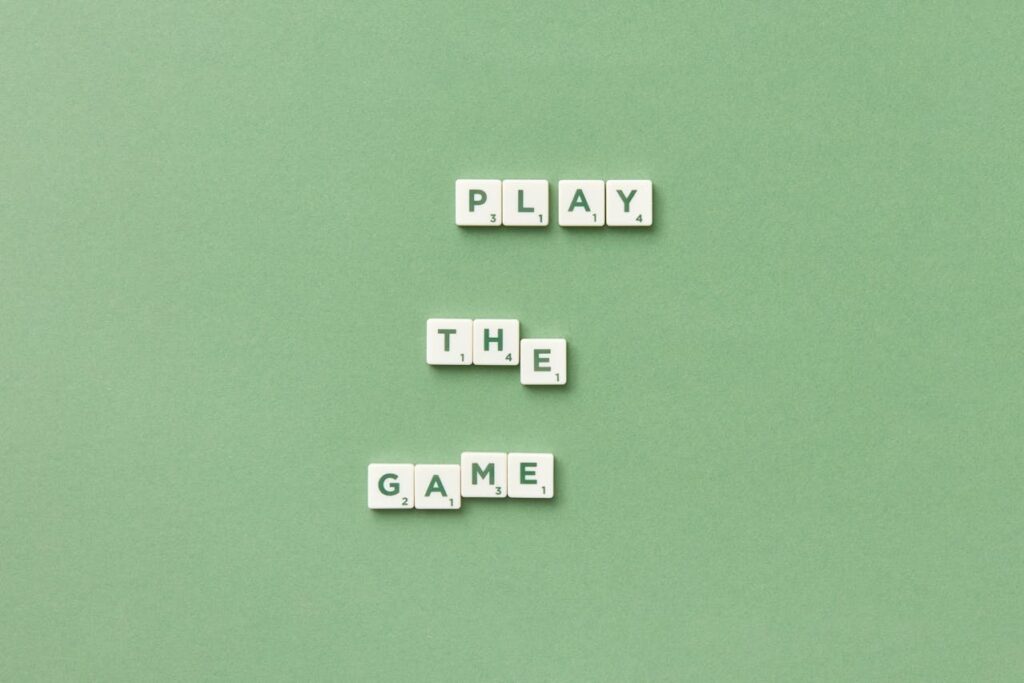
Every day, we are faced with countless decisions that determine the direction of our lives. At the heart of these decisions is a simple yet profound choice: the pain of discipline or the pain of regret. While discipline requires effort and discomfort in the short term, it leads to growth, achievement, and long-term fulfillment. On the other hand, avoiding discipline may offer temporary ease but often results in future regret, missed opportunities, and a lingering sense of “what could have been.”
Choosing Discipline: A Deliberate Act
Discipline is not something that comes naturally to most people—it’s a conscious decision. It means choosing to act in alignment with your goals and values, even when it’s difficult, inconvenient, or uncomfortable. Unlike regret, which is often the result of inaction, discipline is rooted in intentional effort and the belief that short-term sacrifices lead to long-term rewards.
Setting Clear Goals
The foundation of discipline begins with setting clear, achievable goals. Without a destination in mind, it’s easy to drift aimlessly and fall into patterns that lead to regret. Clearly defined goals provide direction and motivation, acting as a constant reminder of what you’re working toward.
Start by identifying what you truly want to accomplish—whether it’s personal, professional, or relational—and break those big goals into smaller, actionable steps. By doing so, discipline becomes more manageable, as you’re no longer overwhelmed by the size of the task. Instead, you can focus on one step at a time, moving steadily toward your desired outcome.
Creating Routines
One of the most effective ways to choose discipline consistently is by establishing routines. Routines help to automate the decision-making process, reducing the mental effort required to stay disciplined. When you follow a structured routine, discipline becomes a habit, ingrained in your daily life.
For example, if your goal is to improve your physical health, building a morning exercise routine ensures that you prioritize fitness without having to debate whether or not you’ll exercise each day. The routine takes the decision out of your hands and puts it into motion, allowing discipline to become second nature.
Accountability: Enlisting Support
Accountability is another key factor in fostering discipline. Having someone to hold you accountable—whether it’s a mentor, friend, coach, or colleague—can keep you on track when your motivation wanes. Accountability partners provide encouragement, perspective, and, most importantly, a sense of responsibility to follow through on your commitments.
Knowing that someone else is invested in your progress can be a powerful motivator to stay disciplined, even when you feel like giving up. Regular check-ins, progress reports, or even shared goals can help you maintain focus and prevent the temptation to fall into inaction, which ultimately leads to regret.
Embracing Small Wins
Discipline is not an all-or-nothing endeavor. It’s important to recognize and celebrate small victories along the way. Each time you choose discipline, you move one step closer to your goal, and each of those steps deserves acknowledgment. These small wins help reinforce positive behavior, making it easier to maintain discipline over the long term.
By embracing incremental progress, you build momentum, which increases your resilience in the face of challenges. This forward motion helps to combat the fear of failure and keeps you from slipping into regret. Remember, discipline is about the journey as much as it is about the destination.
Overcoming Obstacles to Discipline
There will inevitably be moments when choosing discipline feels too hard, or when distractions and excuses start to outweigh your commitment. In these moments, it’s crucial to remind yourself of the cost of regret. Reflect on the consequences of avoiding discipline—whether it’s missing out on an opportunity, falling behind on a personal goal, or letting your potential go unfulfilled.
Visualizing the impact of future regret can serve as a powerful motivator to push through difficult times. It also helps to reframe obstacles as opportunities for growth. By viewing challenges as part of the process, rather than barriers to success, you can develop the resilience necessary to maintain discipline in the long run.
The Long-Term Rewards of Discipline
While the short-term pain of discipline may be uncomfortable, the long-term rewards far outweigh the discomfort. Discipline allows you to achieve your goals, realize your potential, and live a life that aligns with your values. It fosters a sense of pride, accomplishment, and self-respect, knowing that you put in the effort to create a better future for yourself.
On the contrary, avoiding discipline leads to the regret of missed opportunities and unfulfilled dreams. By choosing discipline over regret, you not only avoid the emotional burden of “what could have been,” but you also build a life of purpose, achievement, and satisfaction.
At the end of the day, the power of choice is in your hands. Every decision, big or small, offers the opportunity to choose discipline over regret. By setting clear goals, creating routines, seeking accountability, and embracing challenges, you can develop the discipline needed to achieve lasting success and fulfillment. Choose wisely—your future self will thank you.
How to Manage Regret and Move Forward
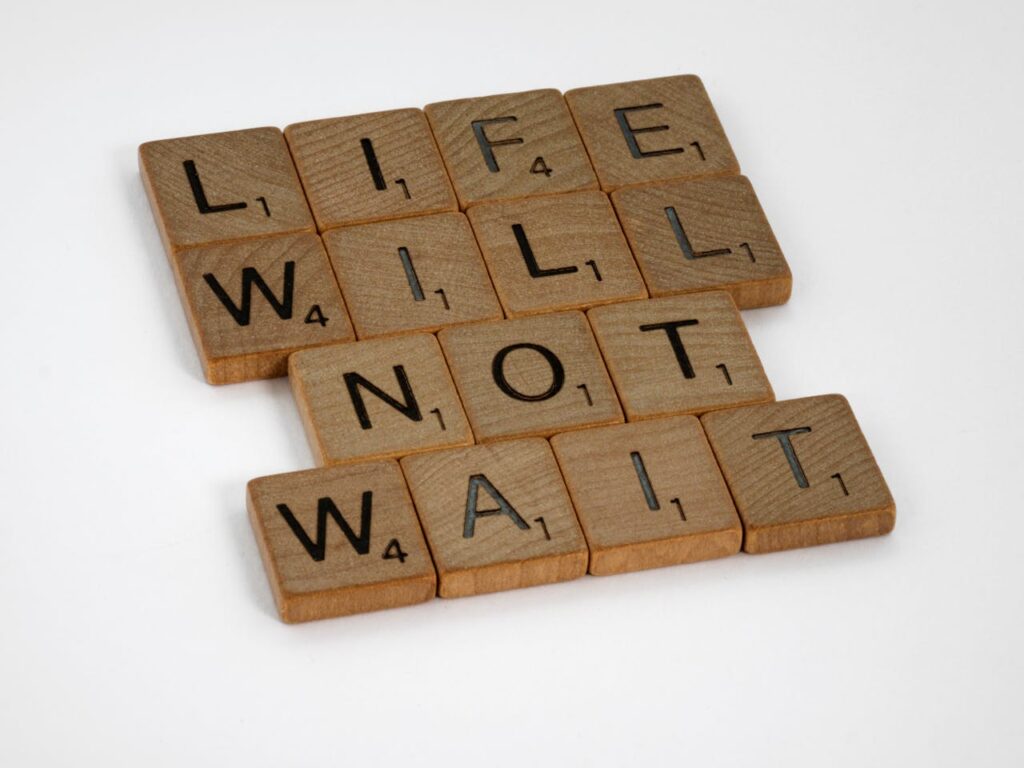
Even with the best intentions and disciplined efforts, regret can still creep into our lives. Whether it stems from missed opportunities, poor decisions, or moments when we let fear or doubt dictate our actions, regret can feel heavy and difficult to shake. However, it doesn’t have to define your future. In fact, when managed well, regret can become a powerful catalyst for growth and transformation.
Here’s how you can manage regret and turn it into an opportunity for self-improvement:
1. Focus on Self-Forgiveness
The first and most crucial step in managing regret is practicing self-forgiveness. Regret often brings with it feelings of guilt, shame, or frustration, which can weigh heavily on your mental and emotional well-being. These negative emotions, if left unchecked, can hold you back and prevent you from moving forward.
Recognize that no one is perfect, and mistakes are an inherent part of life. Instead of dwelling on the “what ifs,” focus on the lessons you’ve learned from your past decisions. Self-forgiveness is about acknowledging your humanity and giving yourself permission to move on. It’s essential to be kind to yourself, let go of harsh self-judgment, and accept that everyone encounters setbacks on their journey to growth.
Learn from Past Mistakes
Regret is often rooted in the realization that we could have acted differently or made better choices. Rather than viewing these experiences as failures, frame them as opportunities for growth. Reflect on your regrets and identify the lessons hidden within them. What did you learn about yourself, your actions, or your priorities? How can you use that knowledge to improve your future decisions?
Learning from your mistakes is a powerful way to transform regret into a valuable resource for self-improvement. By identifying the factors that led to your regret, you can better understand what you need to change and avoid repeating those mistakes. This mindset shift turns regret into a learning tool that helps you grow stronger and more resilient.
Take Action in the Present
One of the most effective ways to overcome regret is to take proactive steps in the present. Regret often stems from inaction, but you can counterbalance that by committing to positive action moving forward. If you regret not pursuing a certain opportunity or making a specific choice, ask yourself what steps you can take now to remedy the situation or move in a new direction.
Even small, incremental actions can help you regain a sense of control and progress. Whether it’s revisiting a forgotten goal, reaching out to someone for a second chance, or setting new, achievable objectives, taking action empowers you to reshape your future. Rather than allowing regret to paralyze you, use it as motivation to pursue the life and opportunities you truly want.
Shift Your Focus to Growth
It’s important to remember that regret, like any other emotion, is temporary. Instead of fixating on the negative aspects of past choices, shift your focus to growth and improvement. Each moment is a new opportunity to become better and closer to your goals. View regret as part of your personal evolution—a reminder that you’re continually learning and refining who you are.
By shifting your mindset from regret to growth, you create space for optimism and possibility. Regret may signal past disappointments, but it doesn’t have to limit your future. Embrace the process of growth and appreciate how far you’ve come, even if the journey involved some missteps along the way.
Practice Gratitude for the Present
Gratitude is a powerful antidote to regret. When you focus on what you have in the present—your strengths, opportunities, and relationships—you shift your perspective away from the negative feelings associated with past regrets. Practice mindfulness and gratitude by acknowledging the positive aspects of your life, even in small moments.
Gratitude helps to ground you in the present, reminding you that the past doesn’t have to dictate your future. By appreciating the opportunities in front of you, you can move forward with a renewed sense of purpose and optimism.
Seek Support and Perspective
Sometimes, regret can feel overwhelming, making it hard to see the path forward. In such cases, seeking support from friends, family, or even a mentor can provide valuable perspective. Sharing your feelings of regret with someone who cares about you allows you to gain clarity and reassurance. Often, others can offer insights or advice that you might not have considered on your own.
Additionally, talking about your regrets can be therapeutic. It can help you release the emotional weight of regret and reframe your thoughts with a more balanced, solution-oriented mindset. With support, you can transform your regrets into stepping stones for personal growth.
Let Go of What You Can’t Change
Finally, it’s essential to recognize that not all regrets can be remedied. Some choices or missed opportunities are simply part of life, and holding onto them can keep you stuck in the past. Learning to let go of what you can’t change is a powerful step toward inner peace. Acceptance of the past allows you to free yourself from the emotional burden of regret and focus on what’s within your control: the present and future.
Letting go doesn’t mean forgetting or ignoring what happened; it means accepting that the past is unchangeable and choosing to move forward with purpose and intention.
Regret doesn’t have to be a permanent burden—it can be a transformative force for personal growth if managed with self-awareness and intentional action. By practicing self-forgiveness, learning from your mistakes, taking proactive steps, and shifting your focus to growth, you can overcome the emotional weight of regret. Ultimately, every experience, including moments of regret, shapes who you are and helps you become a stronger, more resilient individual.
Discipline vs Regret In Conclusion

Life is full of inevitable challenges, setbacks, and moments of uncertainty. While these obstacles are beyond your control, the way you choose to respond to them is entirely in your hands. The path you take—whether you embrace the discomfort of discipline or succumb to the weight of regret—will ultimately define the course of your life.
Discipline, though often uncomfortable in the short term, creates a foundation for long-term fulfillment, success, and personal growth. It requires effort, perseverance, and sacrifice, but it also empowers you to achieve goals that might otherwise seem unattainable. On the other hand, avoiding discipline may offer temporary relief, but it often leads to a heavier burden of regret in the future.
The key to living a life of meaning is to choose wisely. When faced with a decision, ask yourself if it aligns with your long-term vision. Will this choice help you grow, or will it create regret down the line? By committing to discipline in your daily actions—whether through setting goals, building routines, or holding yourself accountable—you can minimize regret and create a life that reflects your values and aspirations.
Your future is shaped by the choices you make today. Embrace discipline, and take control of your destiny. Make the conscious decision to choose discipline over regret, and commit to the actions that will build a brighter, more fulfilling future. Your life is defined by your choices—so choose wisely, and live a life you can look back on with pride and satisfaction.

